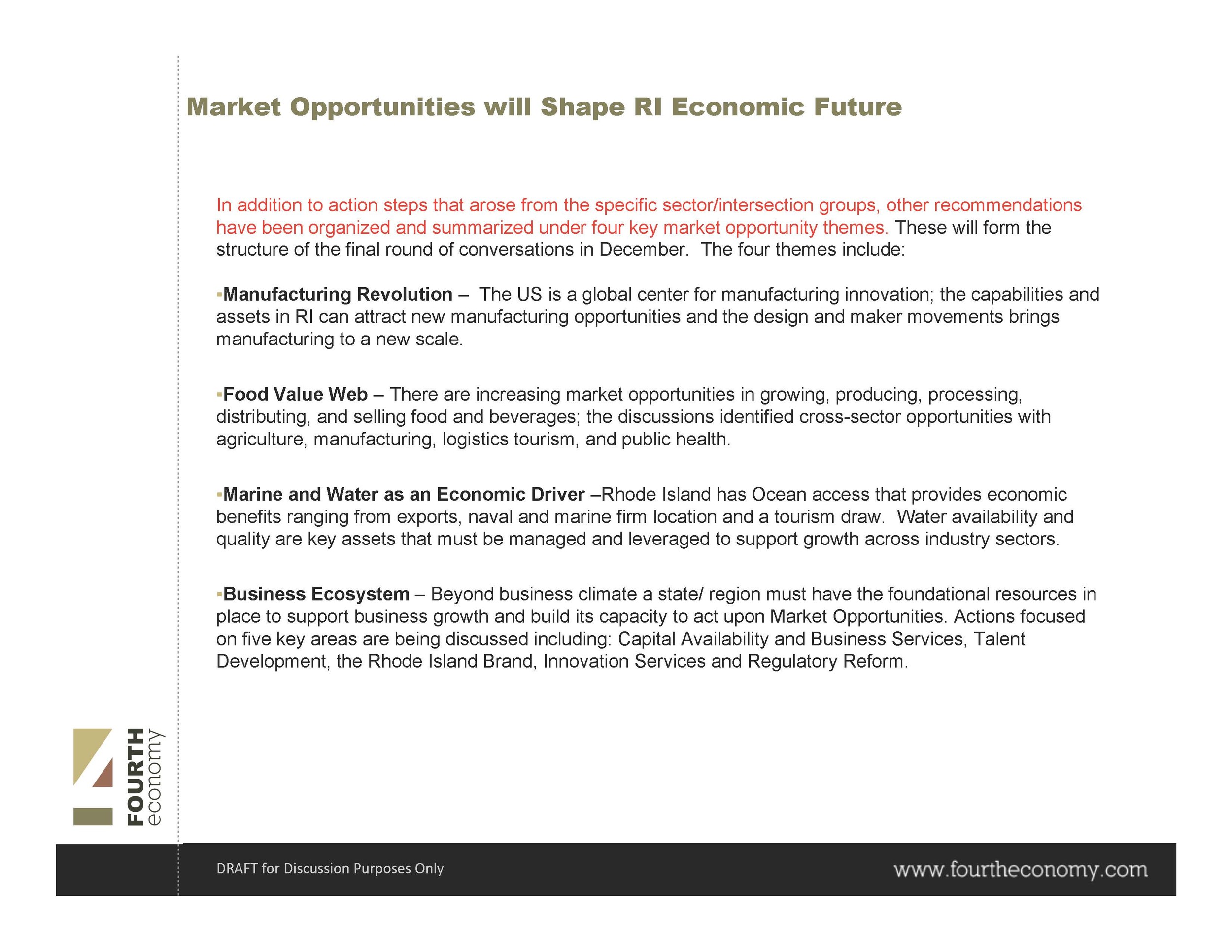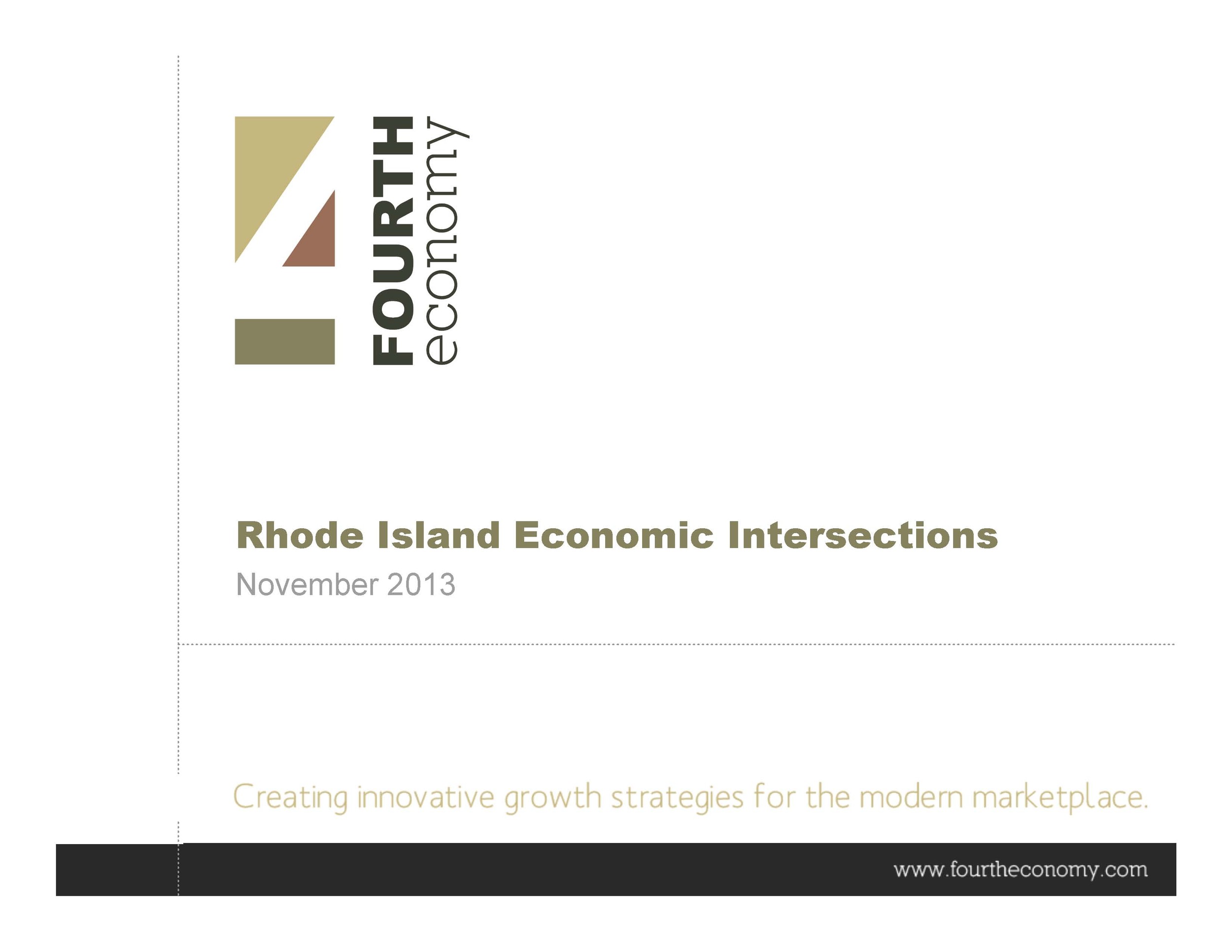This is a story for open, transparent conversation purposes
Who gets to decide Rhode Island’s future economic plans?
PROVIDENCE – Did you know? The market opportunities that will shape Rhode Island’s economic future are a “Manufacturing Revolution,” the “Food Value Web” and “Marine and Water as an Economic Driver.”
That’s according to the results of a three-month, $75,000 process funded by The Rhode Island Foundation and led by The Fourth Economy, a consulting firm, to map out the future opportunities for the state’s economic development.
A fourth targeted intervention, under the heading “Business Ecosystem,” will look to develop “The Rhode Island Brand,” showcasing the state’s ability to market itself and “communicate exciting economic opportunities” regionally, nationally and internationally.
How were these conclusions reached? The process involved discussions held by a “select group of Rhode Island business leaders” from the private sector – with a hand-picked group of news media invited to attend and observe (but apparently not write about) the conversations.
The effort was an outgrowth of the Rhode Island Foundation’s “Making It Happen” convocation.
The outcomes were detailed in a 13-slide PowerPoint deck prepared by The Fourth Economy and sent in an e-mail on Nov. 27 by Neil Steinberg, president and CEO of the Rhode Island Foundation, and Marcel Valois, executive director of the R.I. Economic Development Corporation, to business leaders who had “participated” in the discussions.
The three, targeted opportunities will serve as the basis for an “action agenda,” scheduled to be officially unveiled on Jan. 23, 2014. The “action agenda” will be used in part to inform and contribute to the R.I. Division of Planning’s RhodeMap RI economic development planning process.
What list did the choices come from? They were culled from an original eight potential economic sector “intersections,” including:
- Arts/Culture/Creative
- Biotechnology/Medical/Public Health
- Tourism/Hospitality/Visitor
- Finance/Insurance/Real Estate/Corporate
- Technology/Digital/Software
- Manufacturing/Design/Makers
- Logistics/Connectivity, and
- Agriculture/Aquaculture
How the choices were made? And by whom? These questions, asked by ConvergenceRI, were posed to Jessica David, who is coordinating the project for the Rhode Island Foundation, and to Chris Barnett, the spokesman for the Rhode Island Foundation. They were not answered.
Which media were invited? Both David and Barnett also declined to identify the hand-picked group of news media that were invited to observe the proceedings – but reportedly asked not write about them, according to a number of participants. That “condition,” according to responses from David and Barnett, was inaccurate.
[Barnett, who had previously worked as the spokesman for the R.I. Secretary of State and before that, R.I. Housing, surprisingly asked ConvergenceRI to name its sources of information; ConvergenceRI declined.]
What’s missing? The absence of the academic medical research engine from the targeted market opportunities is striking, according to a number of sources, which attracts tens of millions of dollars in research grants to Rhode Island hospitals and universities each year.
Another glaring omission is the emergence of Rhode Island as a hub for neurosciences research and talent, particularly given the statewide collaborative efforts now underway in brain research.
Neurosciences were relegated to an “action to discuss” under “Innovation Services” in “Business Ecosystem,” with the suggestion given to hold a translational neurosciences symposium to bring together leading researchers in order to “increase awareness of neuroscience capability among investment community.”
The rationale given was that “high-growth companies spurred by innovation and utilization of technology have the potential to quickly create jobs in Rhode Island.”
Rhode Island’s health care reform “evolution,” with its emphasis on patient-centric primary care and its efforts to move toward more accessible, affordable health care and global payments, was never discussed in the document.
Also not discussed were Rhode Island’s strengths in community and diversity. Housing was also not addressed.
What happens next? On Monday, Dec. 9, and Tuesday, Dec. 10, the select groups of business leaders are scheduled to hold four meetings at the Rhode Island Foundation, focused on food, water, manufacturing and the business ecosystem in Rhode Island.
The “Manufacturing Revolution” discussions will be tasked with creating an action agenda “that leverages and further develops our strengths in manufacturing, design and the maker movement.”
The “Marine and Water as an Economic Driver” will focus on Rhode Island’s “assets related to research, out ports, defense, and seafood [that] are connected to our proximity to the ocean,” as well as access to clean water.
The “Food Value Web” will look at “the trend supporting local food economies in supporting and growing businesses related to agri-and aquaculture, value-added food production, food warehousing and distribution, micro brewing and distilling, restaurants and other businesses related to the food industry.”
A fourth discussion, “Business Ecosystem,” will examine issues of “branding, capital availability, business services, talent, innovation services and regulatory reform.”
The haves and the have nots
Innovation rarely emerges as a top-down, directed, mapped-out process. It is very much a collaborative, iterative gestalt, as ideas bubble up and are shaped by interaction, conversation, friction and failure.
The Rhode Island Foundation, one of the oldest and largest community foundations in the country, has enormous resources, built upon the preservation of wealth through trusts – and by managing and increasing those resources through investments.
It has now emerged as a power broker in the development of the state’s future economic policies, using its philanthropy and abundant resources to shape Rhode Island’s future economic direction.
It is doing so in full partnership with the R.I. Economic Development Corporation Director Marcel Valois, with the apparent blessing of many leaders within the top echelon of the business community.
It is one thing to give grants to nonprofit organizations in the community as a philanthropic leader; it is quite a different role to make “investments,” chart strategic courses and choose “winners” in economic development initiatives.
As demonstrated by the apparent shortcomings, then near silence of the “It’s All in Our Backyard” branding campaign launched earlier this fall, the Rhode Island Foundation’s decision-making can be fallible.
For those not “invited” to participate as members of the select group of business leaders from the private sector, are they frozen out of the process? For those whose innovative and entrepreneurial endeavors were not on the table for discussion, how do they participate?
As ConvergenceRI discovered, gaining traction as a new, innovative endeavor outside the traditional power structure, can make it difficult to gain even an audience at the Rhode Island Foundation. The value proposition of ConvergenceRI would seem to be very much aligned with the ongoing efforts: to create a connective, catalytic source of information flow to support and sustain an ongoing collaborative conversation across sectors, something that does not now exist in Rhode Island.
But, after months of repeated efforts to initiate a conversation about the Rhode Island Foundation’s potential interest in ConvergenceRI, Barnett, the spokesman, sent this e-mail as to why there had not been a response: “When someone like you asks us to buy their product, it’s hard to come right out and say ‘no,’ so we were hoping that our silence would speak louder than words.”







